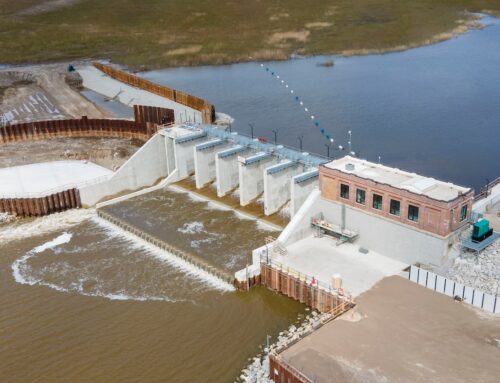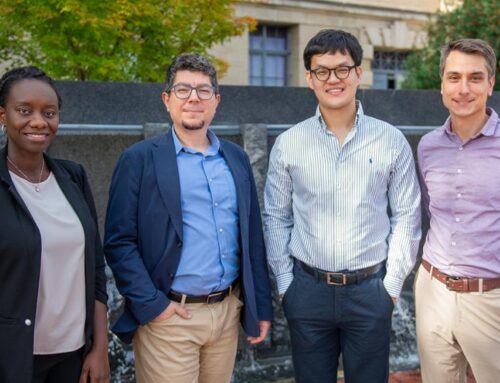Indigenous environmental advocates say data centers risk water, culture and informed conse
October 7, 2025
As massive data centers begin popping up across Oklahoma, Indigenous organizers are sounding the alarm.
Jordan Harmon, a policy associate with the Indigenous Environmental Network and Muscogee Nation citizen, and Chey Morgan, a community organizer and United Keetoowah Band of Cherokee Indians tribal, said projects backed by tech giants such as Amazon and Google are moving forward without public input, often under non-disclosure agreements that block elected officials from sharing details with their own communities.
Through a series of town halls, the duo is pushing for operational transparency and warning that these facilities could threaten water access, cultural preservation, and tribal sovereignty.
Below is an interview conducted by Public Radio Tulsa’s Zach Boblitt with Harmon and Morgan.
Zach Boblitt: What are your goals with these town halls that you’ve been having around Oklahoma?
Jordan Harmon: Well, the goal of the town halls is to educate people about data centers, what they are, what the impacts they can have, and the processes, or even like lack of processes that they’re going through, to be developed so that people can understand what impacts they will really have, and what they can do to intervene or have their voice be heard. Because right now, corporations, county commissions, and other elected leaders are sort of working together to rapidly develop data centers without public input.
So, we’re hoping to empower people with the knowledge of what’s going on, and we’re going to different communities. We started in Tulsa, just because Chey had been tracking the project anthem and project Clydesdale, and we’re both from this area, kind of, and then, because I’m a Muscogee Nation citizen, the Muscogee National Council had proposed a data center on tribal land. So that’s when we started doing town halls for tribal citizens so that they could also be informed.
Boblitt: How does this impact tribal land, the councils, and everything differently, if it does at all? Does it impact them differently at all?
Chey Morgan: Yeah, definitely, there’s this sense that tribal nations need to preserve the data that we have out there in the ether, but AI doesn’t serve the purpose. In fact, hyperscale data centers don’t serve the purpose of preserving our data. In fact, they put our data and our languages at risk.
Harmon: Yeah. So, it’s definitely different because they’re large corporations. Tech companies like Google, Amazon, Meta (and) xAI, are intentionally targeting indigenous and rural communities specifically because there’s a lot of space and a lot of resources available.
The vast majority of the world’s resources are contained, like over 80% of the world’s natural resources are contained within indigenous lands, because indigenous people tend to preserve resources, so they want those and it’s very, particularly personal to me when they’re coming to our tribal leaders, and they’re coming to Our people who’s supposed to represent our interests as Muskogee people, and sort of convincing them to hide things and be secretive to us and sell them like billions of gallons of water and stuff like that.
Boblitt: And you say, hide things and be secretive. Could you go into that a little further? Because I know there’s these NDAs that consistently pop up with these data centers.
Harmon: Yeah, so the non-disclosure agreements have been a huge challenge for a lot of communities, and the corporations hide behind this by claiming, like, this is just daily business. And you know, NDAs are used in day-to-day business practices to keep corporate secrets.
But, this is not really the same thing as a corporate secret.
When you’re talking about a huge project that requires permitting and requires, they’re building whole power plants just to fund it, they need, like, new transmission lines and new water lines. And this is not, that’s not a trade secret. That’s something that impacts the public interest.
Morgan: It’s a subversion of informed consent for the community.
Harmon: Exactly
Boblitt: When you have these NDAs and you have this lack of information and people work, people have these jobs in rural areas, and they have their lives, their kids, and everything else. It just makes it difficult to get that information out there.
Harmon: Yeah, exactly. It’s really unfair to residents and people and citizens who, like, we’re not tech experts, we’re not. But we have to do all this research, and we are knowledgeable in climate justice and indigenous sovereignty.
We do know when something is violating our rights.
Then we have to study up so much so that we can speak about the data center impact specifically, and like, the components of the data center and the different processes and permitting, like, it’s a lot to take on.
Then you call your representative to say, “Hey, can you help me figure out what’s happening?” They say, “No, I can’t say anything because the lawyer signed an NDA.” And they won’t tell me anything.
————————————————————————————————————–
Harmon and Morgan will be running a community town hall at Euchee Butterfly Farm in Bixby Thursday night discussing data centers.
This interview has been edited for length and clarity
Produced with assistance from the Public Media Journalists Association Editor Corps, funded by the Corporation for Public Broadcasting, a private corporation funded by the American people.
Search
RECENT PRESS RELEASES
Related Post




